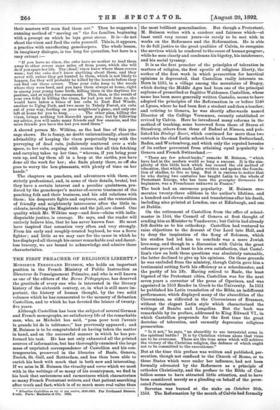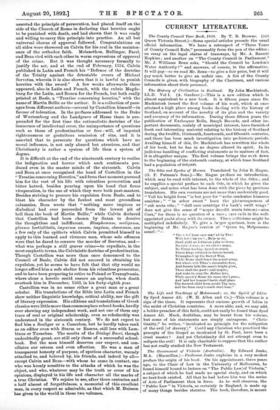THE FIRST PREACHER OF RELIGIOUS LIBERTY.*
MONSIEUR FERDINAND BUISSON, who holds an important position in the French Ministry of Public Instruction as Directeur de l'enseignement Primaire, and who is well known as one of the editors of the Revue Pedagogique, has deserved the gratitude of every one who is interested in the literary history of the sixteenth century, or, in what is still more im- portant, the history of human thought, by the two solid volumes which he has consecrated to the memory of Sebastian Castellion, and to which he has devoted the leisure of twenty- five years.
Although Castellion has been the subject of several German and French monographs, no satisfactory life of the remarkable man, who, as Michelet has raid, " posa pour tout l'avenir la grand° loi de la tolerance," has previously appeared ; and Ii. Buisson is to be congratulated on having taken the matter in hand, and on the successful manner in which he has per- formed his task. He has not only exhausted all the printed sources of information, but has thoroughly examined the large mass of unprinted correspondence of Castellion and his con- temporaries, preserved in the libraries of Basle, Geneva, Zurich, St. Gall, and Rotterdam, and has thus been able to enrich his book with much that is both new and interesting. If we miss in M. Buisson the vivacity and verve which we meet with in the writings of so many of his countrymen, we find in his book that seriousness and earnestness which characterises so many French Protestant writers, and that patient searching after truth and fact, which is of so much more real value than • Sebastian Castellion sa vie et son (eurre, 15164663. Par Ferdinand BUi88011. 2 vols. Pane: Hachette et Cie. 1892.
the most brilliant generalisation. But though a Protestant, M. Buisson writes with a candour and fairness which—at least until very recent years—is rarely to he met with in works on the Reformers and the Reformation. He is able to do full justice to the great qualities of Calvin, to recognise the services which he rendered to the cause of human progrese, while he sees clearly and condemns his bigotry, his intolerance, and his social tyranny.
It is as the first preacher of the principles of toleration in matters of religion, the first apostle of religious liberty, the author of the first work in which persecution for heretical opinions is deprecated, that Castellion really interests us. Born in 1515, in a village among the mountains of Bugey, which during the Middle Ages had been one of the principal
asylums of proscribed or fugitive Waldenses, Castellion, whose name has been more generally written Castalio, seems to have adopted the principles of the Reformation in or before 1540
at Lyons, where he had been first a student and then a teacher, and retiring to Geneva, he was shortly afterwards named
Director of the College Yersonnex, recently established or revived by Calvin. Here he introduced many reforms in the method of teaching, some borrowed from those -of Sturm at Strasburg, others from those of Baduel at Nismes, and pub- lished his Dialogi Sacri, which continued for more than two
centuries the chief Latin school-book in German Switzerland, Baden, and Wurtemburg, and which only the reputed heresies of its author prevented from attaining equal popularity in Geneva and French Switzerland :—
"There are few school-books," remarks M. Buisson, "which have had in the modern world so long a success. It is the sim- plicity of this little book wbich has caused the old method of education, that which made Latin written and spoken the founds,- tion of studies, to live so long. But it is curious to notice that he who during two centuries has taught Latin to the whole of Protestant Europe, who has been the prxceptor Germanise for beginners, was a Frenchman unknown in France."
The book had an enormous popularity. M. Buisson enu- merates twenty-three editions in the author's lifetime, and a hundred and eleven editions and translations after his death, including nine printed at London, one at Edinburgh, and one at Dublin.
On the retirement of Castellion from the office of school- master in 1541, the Council of Geneva at first thought of sending him as Minister to Vandceuvre ; but Calvin had already felt doubts as to his orthodoxy. Castellion had ventured to raise objections to the descent of Our Lord into Hell, and to deny the inspiration of the Song of Solomon, which his studies had led him to conclude was a mere Jewish love-song, and though in a discussion with Calvin the great reformer proved, at least to his own satisfaction, that Castel- lion's view on both these questions was absolutely untenable, the latter declined to give tip his opinions. On these grounds he was excluded from the ministry, though Calvin gave him a testimonial setting forth his efficiency as a schoolmaster, and the purity of his life. Having retired to Basle, the least bigoted of the Protestant cities, Castellion was for the next seven years a corrector of the press of Oporinus, and was appointed in 1553 Reader in Greek to the University. In 1551 he published his Latin translation of the Bible, an indifferent
performance, which displayed many of the absurdities of the Ciceronians, as ridiculed in the Ciceronianus of Erasmus,
without the elegant Latin style which characterised the writings of Bembo and Longolius. But the book was remarkable by its preface, addressed to King Edward VI., in which Castellion propounds for the first time the great doctrine of toleration, and earnestly deprecates religions persecution.
"Is it not," he says, "an absurdity to use terrestrial arms in the spiritual battle? It is by Christian virtues alone that vices are to be overcome. These are the true arms which will achieve the victory of the Christian religion, the defence of which ought not to be committed to the executioner."
But at the time this preface was written and published, per- secution, though not confined to the Church of Rome, or to those States which were under her influence, had not been formally advocated by the Reformers as a principle of orthodox Christianity, and the preface to the Bible of Cas- tellion seems to have attracted little attention, and to have been considered merely as a pleading on behalf of the perse- cuted Protestants.
Servetus was burned at the stake on October 26th, 1553. The Reformation by the mouth of Calvin had formally
asserted the principle of persecution, had placed itself on the side of the Church of Rome in declaring that heretics ought to be punished with death, and had shown that it was ready and willing to carry this principle into practice. An all but universal chorus of approval followed. Congratulations on all aides were showered on Calvin for his zeal in the mainten- ance of the orthodox faith. Melancthon, Ballinger, Farel, and Beza vied with each other in warm expressions of approval of the crime. Bat it was thought necessary formally to justify the act, and at the end of February, 1554, Calvin published in Latin and French his "Defence of the doctrine of the Trinity against the detestable errors of Michael Servetus, wherein it is also shown that it is lawful to punish heretics with the sword." A few weeks afterwards there appeared, also in Latin and French, with the rubric Magde- burg for the Latin, and Rouen for the French, but both really printed at Basle, a "Treatise concerning heretics," with the name of Martin Belie as the author. It is a collection of pass- ages from different authors—several by Castellion himself—in favour of toleration. In the prefaces addressed to the Duke of Wurtemberg and the Landgrave of Hesse there is pro- pounded for the first time the rationalistic doctrine of the innocence of intellectual error, the unimportance of questions such as those of predestination or free - will, of imputed righteousness or gratuitous remission of sins, and it is asserted that to persecute for questions which have no moral influence, is not only absurd but atrocious, and that Christianity is rather a system of life than a system of dogma.
It is difficult at the end of the nineteenth century to realise • the indignation and horror which such sentiments pro- duced even in the master minds of the sixteenth. Calvin and Beza at once recognised the hand of Castellion in the ‘. Treatise concerning Heretics," and from that moment pursued him for the rest of his life with relentless persecution and bitter hatred, besides pouring upon his head that fierce vituperation, in the use of which they were both past-masters.
Besides striving to procure his expulsion from Basle, and to blast his character by the foulest and most groundless
calumnies, Beza wrote that "nothing more impious or diabolical had ever proceeded from the lowest pit of bell than the book of Martin Belle," while Calvin declared that Castellion had been chosen by Satan to deceive the thoughtless and indifferent. Blasphemum, malignum, plenum, bestialitatis, impurum =nem, impiunc, obsecenum, are a few only of the epithets which Calvin permitted himself to apply to this learned and virtuous man, whose sole offences were that he dared to censure the murder of Servetus, and— what was perhaps a still graver crime—to repudiate, in the most emphatic terms, the Calvinistic doctrine of predestination. Though Castellion was more than once denounced to the Council of Basle, Calvin did not succeed in obtaining his expulsion, yet he seems to have felt that that city would no longer afford him a safe shelter from his relentless persecutor, and to have been preparing to retire to Poland or Transylvania, Where alone a heretic (Ionia ensure an asylum, when death overtook him in December, 1563, in his forty-eighth year.
Castellion was in no sense either a great man or a great scholar. His translations of the Bible into Latin and French show neither linguistic knowledge, critical ability, nor the gift of literary expression. His editions and translations of Greek classics were little more than commonplace school-books, hardly ever showing any independent work, and not one of them any trace of real or original scholarship, even as scholarship was understood in the sixteenth century. We do not expect to find him a Scaliger or a Casaubon, but he hardly takes rank as an editor even with Sturm or Raisins, still less with Lam- binus or Turnebus. The merits of the Dialogi Bacri, though undoubtedly great, are still only those of a successful school- book. But the man himself deserves our respect, and con- ciliates our esteem and even affection. He was a man of transparent honesty of purpose, of spotless character, warmly attached to, and beloved by, his friends, and indeed by all—. except Calvin and Beza—with whom he came in contact, one who was keenly sensitive to the attacks of which he was the object, and who, whatever may be the truth or error of his opinions, displayed in his life and character all the marks of a true Christian. We rejoice to see, after three centuries and a half almost of forgetfulness, a memorial of this excellent man, in every respect so admirable, as that which M. Buisson has given to the world in these two volumes.



































 Previous page
Previous page